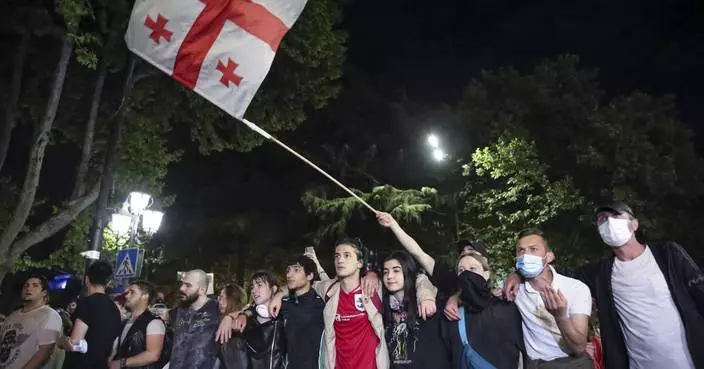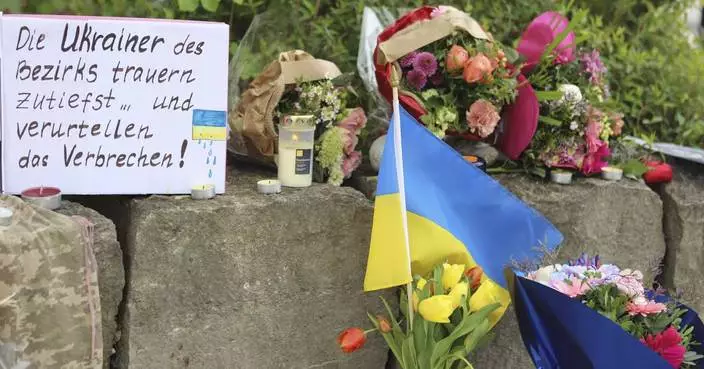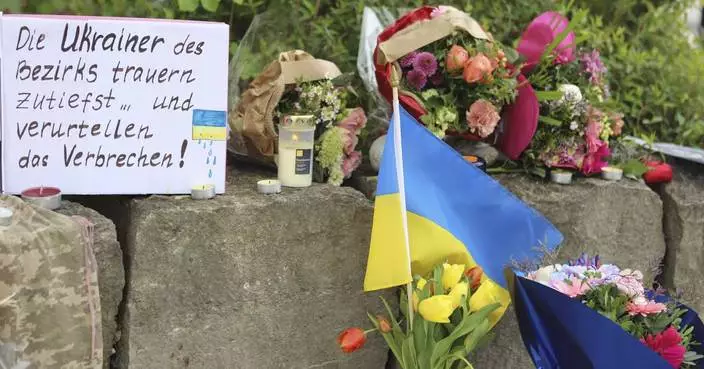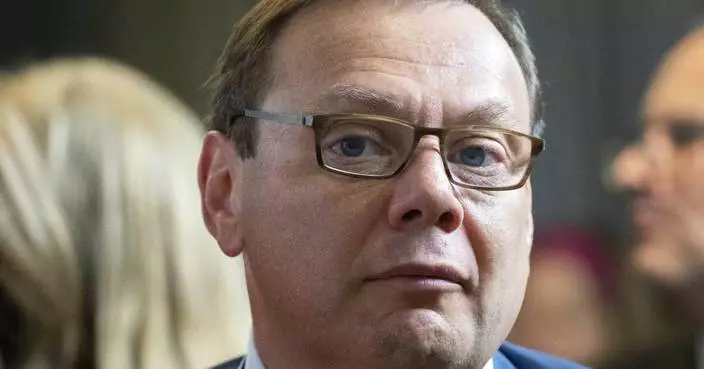Beneath Volgograd's baking early morning sun, clouds of midges pester factory workers at the Red October steelworks as they clock in. These workers are the lucky ones — they're still employed, while many of their colleagues were temporarily laid off because of the World Cup.
The layoffs have aggravated troubles at the struggling factory, prompting angry workers to plan a protest timed for the city's first World Cup match Monday. Authorities are apparently trying to head off trouble through pressure and promises of cash.
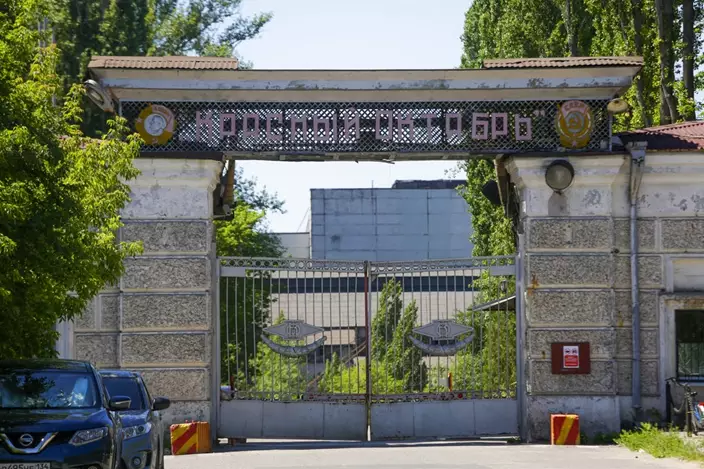
A gate of the Red October factory buildings is seen near the new the World Cup stadium, on the banks of the Volga River in Volgograd, Russia, Friday, June 15, 2018. Workers at the Red October steelworks in Volgograd are angry over temporary layoffs linked to the World Cup and deeper financial troubles at the factory, which sits in the shadow of the Volgograd Arena tournament venue. The situation reflects difficult daily reality in Russia even as President Vladimir Putin seeks to showcase his economic successes. (AP Photo/Dmitriy Rogulin)
Welcome to the daily realities of President Vladimir Putin's Russia, even as he tries to use the Cup to show off his economic and political successes.
"I am worried about what is going on here," says 38-year-old metal welder Mikhail Privalov, mopping the sweat off his brow as he enters the factory, which sits in the shadow of the gleaming Volgograd Arena. "The management is handling this situation very badly."
The factory, whose faded red and yellow front still bears the emblems of the Soviet Union, is famous for weathering shells and gunfire from Adolf Hitler's armies and continuing steel production during the vicious World War II Battle of Stalingrad, as the city used to be called.
Today, the world's largest sports tournament has brought the plant to a partial standstill.
Under measures intended to reduce stores of hazardous materials which could be used by terrorists, factories have been asked to change the way they work before and during the World Cup, which opened Thursday and runs through July 15.
Meanwhile, Red October workers are facing wage cuts and delays as the factory grapples with restructuring, a corruption investigation and tax troubles.
"We're continuing to work but we don't really know why, when our wages have been cut so low. The administration keeps promising us things but who believes them?" said Vitaly, a father of two who spoke on condition his last name not be used. Many workers fear repercussions if they speak out publicly.
The exact number of people on temporary layoffs is unclear, but local journalists and factory workers estimate that more than half of the factory's 3,500 employees are out of work for the next month. Several attempts by The AP to contact factory management were ignored.
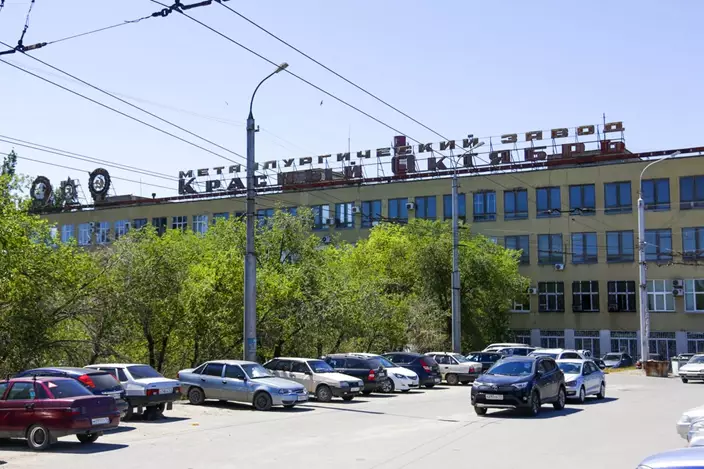
The Red October factory building is seen next to the new the World Cup stadium on the banks of the Volga River in Volgograd, Russia, Friday, June 15, 2018. Workers at the Red October steelworks in Volgograd are angry over temporary layoffs linked to the World Cup and deeper financial troubles at the factory, which sits in the shadow of the Volgograd Arena tournament venue. The situation reflects difficult daily reality in Russia even as President Vladimir Putin seeks to showcase his economic successes. (AP Photo/Dmitriy Rogulin)
About 70 steelworkers staged a walkout June 7, protesting the factory's problems.
"I need to feed my family and kids," 37-year-old Denis Mozlyakov, who participated in the walkout, told The Associated Press through his VKontakte profile, Russia's alternative to Facebook. "I didn't see another way out."
The following day, union representatives penned an open letter to Putin, in which they described mass layoffs and insufficient funds for the full payment of wages, calling it "a catastrophic situation. which could bring (the factory) to a complete standstill."
The union then announced a protest rally June 18 - the day of Volgograd 's first World Cup match, England vs. Tunisia.
Since then, the administration has sought to placate workers, notably with assurances that May's delayed wages will be paid.
As the World Cup opened Thursday in Moscow, union representative Sergei Belousov — among those who signed the letter to Putin — told The AP, "all our problems have been solved, there will be no rally - we'll go to support the football instead!"
Some 10 other workers contacted by The AP over Vkontakte were less optimistic, describing their uncertainty and distrust in the administration's promises. They declined to meet in person for fear of backlash or threats to their personal safety.
Mozlyakov, who has worked at the factory for three years, said, "Every day there are new rumors. I can't believe any of them. The factory has turned into a swamp of lies and deception."
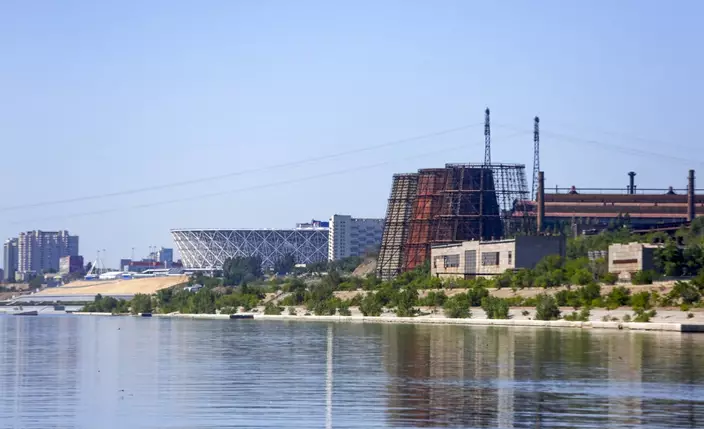
The Red October factory buildings, right, are seen next to the new the World Cup stadium, left, on the banks of the Volga River in Volgograd, Russia, Friday, June 15, 2018. Workers at the Red October steelworks in Volgograd are angry over temporary layoffs linked to the World Cup and deeper financial troubles at the factory, which sits in the shadow of the Volgograd Arena tournament venue. The situation reflects difficult daily reality in Russia even as President Vladimir Putin seeks to showcase his economic successes. (AP Photo/Dmitriy Rogulin)
Sergei Zhukov, a local economic journalist who runs the internet portal volpromex.ru , says the factory's financial difficulties reach far beyond the World Cup. In 2016, six plant managers were detained in a corruption scandal, suspected of stealing millions of dollars. Meanwhile the tax inspectorate has launched legal action against the current management, which denies wrongdoing.
In addition, he said, the factory is undergoing modernization that is requiring production cutbacks.
"The current situation is linked with general, deeper problems at the factory," he said. "With or without the World Cup, these problems would still exist."
Yet Red October's troubles have been exacerbated by security measures introduced by Russia's Federal Security Service ahead of the tournament, which ordered many factories to stop or change certain procedures.
"The purpose is to avoid the use of hazardous materials which can possibly be a threat to large masses of people," World Cup organizing committee CEO Alexei Sorokin said last month. "The use and production of hazardous materials will be somewhat reduced, but the purpose is not to shut down factories."
Volgograd Mayor Andrei Kosolapov said in May that factories in his city wouldn't close entirely but enter into an unspecified "technical regime" during the Cup, an apparent euphemism for partial closure.
"The priority is the championship, the people are secondary," said factory shift supervisor Dmitry Egorov. "The people are left without the means of survival and the enterprise managers and representatives do not care."
TBILISI, Georgia (AP) — Georgia has been engulfed by huge protests triggered by a proposed law that critics see as a threat to media freedom and the country’s aspirations to join the European Union.
Here is a look at the bill and the protests it has ignited:
The bill would require media and nongovernmental organizations and other nonprofits to register as “pursuing the interests of a foreign power” if they receive more than 20% of funding from abroad.
The legislature approved a second reading of the bill Wednesday, and the third and final reading is expected later this month.
The proposed legislation is nearly identical to the one that the governing Georgian Dream party was pressured to withdraw last year after street protests.
The governing party says the bill is necessary to stem what it deems as harmful foreign influence over the country’s political scene and to prevent unidentified foreign actors from trying to destabilize the country’s political scene.
The opposition denounces the bill as “the Russian law” because Moscow uses similar legislation to stigmatize independent news media and organizations critical of the Kremlin. Opponents of the bill say the fact that it is now before parliament is a sign of Moscow’s purported influence over Georgia. They fear it will become an impediment to the country’s long-sought prospects of joining the European Union.
Georgian President Salome Zourabichvili, who is increasingly at odds with the governing party, has vowed to veto the law, but Georgian Dream has a majority sufficient to override a presidential veto.
Russia-Georgia relations have been strained and turbulent since the 1991 collapse of the Soviet Union.
In August 2008, Russia fought a brief war with Georgia, which had made a botched attempt to regain control over the breakaway province of South Ossetia. Moscow then recognized South Ossetia and another separatist province, Abkhazia, as independent states and beefed up its military presence there. Most of the world considers both breakaway regions to be parts of Georgia, a former Soviet republic.
Tbilisi has ruptured diplomatic ties with Moscow, and the separatist regions’ status remains a key irritant, even as Russia-Georgia relations have improved in recent years.
The opposition United National Movement accuses Georgian Dream, which was founded by Bidzina Ivanishvili, a billionaire who made his fortune in Russia, of serving Moscow’s interests — an accusation the governing party vehemently denies.
For several successive days, thousands of demonstrators besieged the parliament building in a bid to block the bill’s passage and scuffled with police.
Police used tear gas and water cannons to disperse the crowds. Over 60 protesters have been arrested and several people have been injured. Levan Khabeishvili, chairman of the United National Movement, was among those injured.
On Thursday, parliament canceled its scheduled session, saying the move was because of damage to the building during Wednesday’s protests.
Another demonstration by thousands of people took place on Friday night, including a march to protest outside Georgian Dream's headquarters, but there were no reports of clashes.
EU foreign policy chief Josep Borrell has described the parliament’s move as “a very concerning development” and warned that “final adoption of this legislation would negatively impact Georgia’s progress on its EU path.”
“This law is not in line with EU core norms and values,” Borrell said in a statement last month. “The proposed legislation would limit the capacity of civil society and media organizations to operate freely, could limit freedom of expression and unfairly stigmatize organizations that deliver benefits to the citizens of Georgia.”

A demonstrator gestures standing between opposition protesters who gather to protest against "the Russian law" in Tbilisi, Georgia, on Tuesday, April 30, 2024. Clashes erupted between police and opposition demonstrators protesting a new bill intended to track foreign influence that the opposition denounced as Russia-inspired. (AP Photo/Zurab Tsertsvadze)

Riot police use a water cannon during an opposition protest against "the Russian law" near the Parliament building in Tbilisi, Georgia, Tuesday night, April 30, 2024. Clashes erupted between police and opposition demonstrators protesting a new bill intended to track foreign influence that the opposition denounced as Russia-inspired. (AP Photo/Zurab Tsertsvadze)

EDS NOTE: OBSCENITY - A demonstrator gestures trying as riot police use a water cannon during an opposition protest against "the Russian law" near the Parliament building in Tbilisi, Georgia, Tuesday night, April 30, 2024. Clashes erupted between police and opposition demonstrators protesting a new bill intended to track foreign influence that the opposition denounced as Russia-inspired. (AP Photo/Zurab Tsertsvadze)

Police use water cannons and tear gas against demonstrators during an opposition protest against "the Russian law" near the Parliament building in Tbilisi, Georgia, on Wednesday, May 1, 2024. Protesters denounce the bill as "the Russian law" because Moscow uses similar legislation to stigmatize independent news media and organizations critical of the Kremlin. (AP Photo/Zurab Tsertsvadze)

Police face demonstrators during an opposition protest against "the Russian law" near the Parliament building in Tbilisi, Georgia, on Wednesday, May 1, 2024. Protesters denounce the bill as "the Russian law" because Moscow uses similar legislation to stigmatize independent news media and organizations critical of the Kremlin. (AP Photo/Zurab Tsertsvadze)

A demonstrator gestures while arguing with the police during an opposition protest against "the Russian law" near the Parliament building in Tbilisi, Georgia, on Wednesday, May 1, 2024. Protesters denounce the bill as "the Russian law" because Moscow uses similar legislation to stigmatize independent news media and organizations critical of the Kremlin. (AP Photo/Zurab Tsertsvadze)

Demonstrators wave Georgian national flag during an opposition protest against "the Russian law" near the Parliament building in Tbilisi, Georgia, on Wednesday, May 1, 2024. Protesters denounce the bill as "the Russian law" because Moscow uses similar legislation to stigmatize independent news media and organizations critical of the Kremlin. (AP Photo/Zurab Tsertsvadze)

A woman shows a heart standing in front of riot police during an opposition protest against "the Russian law" near the Parliament building in Tbilisi, Georgia, on Wednesday, May 1, 2024. Clashes erupted between police and opposition demonstrators protesting a new bill intended to track foreign influence that the opposition denounced as Russia-inspired. (AP Photo/Zurab Tsertsvadze)

Demonstrators scuffle with riot police during an opposition protest against "the Russian law" near the Parliament building in Tbilisi, Georgia, on Wednesday, May 1, 2024. Clashes erupted between police and opposition demonstrators protesting a new bill intended to track foreign influence that the opposition denounced as Russia-inspired. (AP Photo/Zurab Tsertsvadze)

A couple embrace during an opposition protest against "the Russian law" near the Parliament building in Tbilisi, Georgia, on Wednesday, May 1, 2024. Clashes erupted between police and opposition demonstrators protesting a new bill intended to track foreign influence that the opposition denounced as Russia-inspired. (AP Photo/Zurab Tsertsvadze)

Demonstrators sit in front of police line during an opposition protest against "the Russian law" near the Parliament building in Tbilisi, Georgia, on Tuesday, April 30, 2024. Clashes erupted between police and opposition demonstrators protesting a new bill intended to track foreign influence that the opposition denounced as Russia-inspired. (AP Photo/Zurab Tsertsvadze)

Riot police use a water cannon during an opposition protest against "the Russian law" near the Parliament building in Tbilisi, Georgia, on Wednesday, May 1, 2024. Clashes erupted between police and opposition demonstrators protesting a new bill intended to track foreign influence that the opposition denounced as Russia-inspired. (AP Photo/Zurab Tsertsvadze)


















